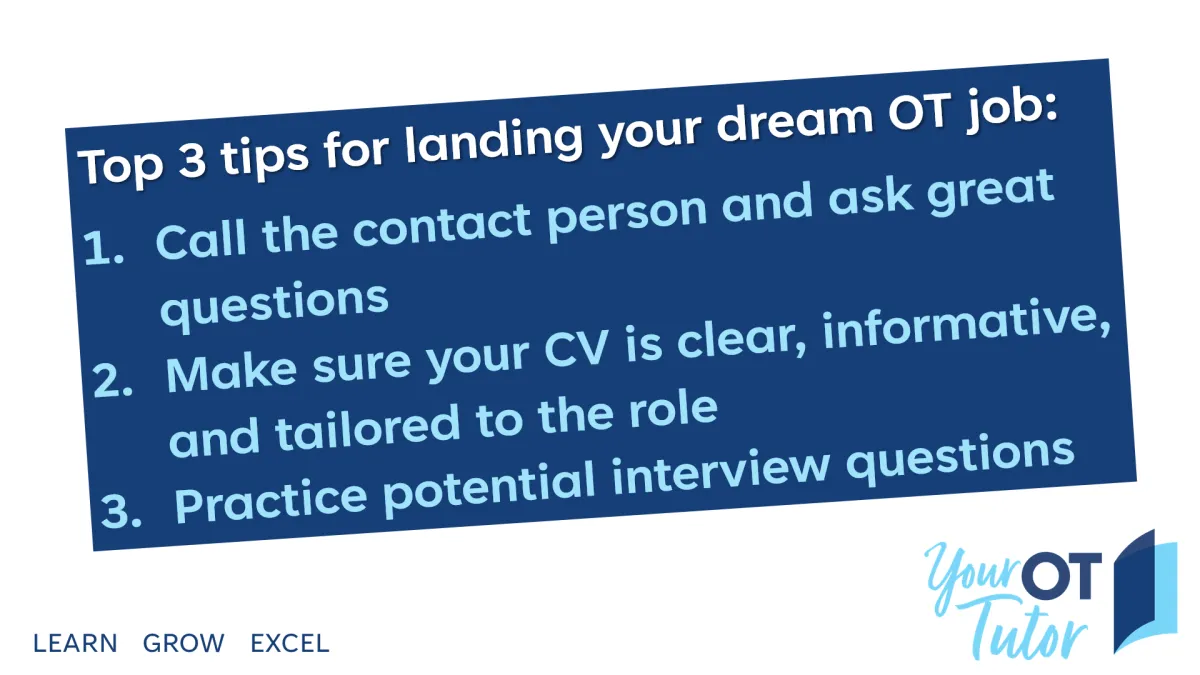THE YOUR OT TUTOR BLOG
Articles on important topics for occupational therapists...

THE TOP 3 TIPS FOR LANDING YOUR DREAM OT JOB…
How can you increase your chances of landing your dream OT role in any setting?
Right now is a great time to be an OT – there are plenty of jobs available and employers are willing to take on OTs with minimal or no experience in the particular setting or caseload. However, that doesn’t mean you shouldn’t try your best to make a great first impression and stand out from other applicants, as there are still jobs where competition is fierce (think new grad public hospital rotational positions!).
As someone who’s had lots of experience recruiting OTs, and helping OTs find their dream job, here are my top 3 tips:
1. Call the contact person and ask great questions
Calling and speaking with someone makes you more than just a name on a CV. It gives you the opportunity to personally introduce yourself and show your genuine interest in the position. But don’t just call for the sake of calling! Do some research about the organisation or company (checking out their website and social media pages is great for this) then prepare a list of questions to ask, but make sure it’s not something you could easily find out yourself. You could ask more about the clients they see or what the future goals of the company might be, and then you could use this to really tailor your CV or interview responses to what they are looking for. It’s also your opportunity to interview them – did you feel comfortable talking to them, did they give straight answers, or did they seem to be hiding something? This will help you decide whether it is even the right decision to apply in the first place.
2. Make sure your CV is clear and informative
There are hundreds of CV templates available on the internet, but which one usually works for OTs? OTs should provide clear information about placement experiences (for new grads) and employment history with an outline of the duties and responsibilities they involved, as well as any special skills, achievements, licences, accreditation, and professional development. They don’t need to know what subjects you did in high-school, or for older applicants, what your first job was as a teenager. This is still a lot to fit in to 2-3 pages (ideally) so keep it succinct with dot points, and don’t bombard the reader with too many fancy fonts or colours; black and white with a few splashes of colour in your headings or borders is usually perfect. Make sure the CV content is specific to the job you are applying for, especially if you are looking to start or change your career and are applying for everything! If the job is in paediatrics, highlight your paediatric skills and experiences, and make sure your other experiences or skills are worded in a way that shows they are easily transferable to the paeds setting.
3. Practice potential interview questions
Once you’ve done a few OT interviews, you’ll realise there are some common questions that often come up. While you can’t predict exactly what you will be asked, there are some common topics you can prepare possible responses or examples for, to help you feel more prepared. These topics could be your teamwork skills, ability to handle high workload demands and prioritise your time, how you approach learning a new skill, how you would handle a challenging client interaction, and whether you have experience in quality improvement projects (this is especially popular in public health). There will also usually be a case study, which may be given to you 10 minutes before the interview or within the interview itself. For these you can prepare your own practice case studies based on a ‘typical’ client seen within the caseload (this is where calling before applying can be helpful!), and practice talking through what your OT process might be. The key words there are “practice talking through” – writing down prepared answers and reading them is one thing, but the most helpful thing will be to test yourself and practice actually saying your responses out loud without referring to your notes – it can be trickier than you think and the more practice the better.
The extra bonus tip is to take your time when applying for and saying yes to a job – there are so many jobs available that there is no need to say yes to the first job offer you get, or to stay in a job that hasn’t turned out the way you had hoped. Our clients need great OTs that are happy in their jobs, so they can keep providing the best service possible.
If you found this blog helpful, then sign-up to the Your OT Tutor mailing list to be notified when new resources, courses, and blogs are available.






